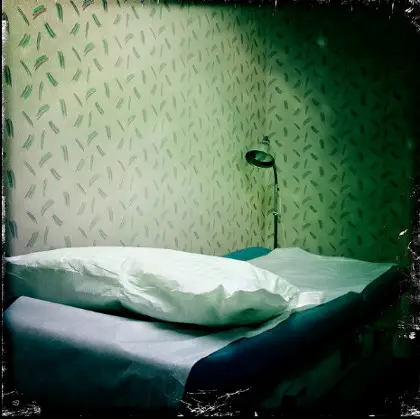
Daft Old Duffer returns. Guest opinion articles do not necessarily reflect the views of the publication. Ed
I received a letter from my Health Centre this week.
It invited me to partake in a new way of keeping track of my blood pressure. Instead of attending the Health Centre so that a nurse could check me over, I would be loaned a machine for a week every year, and use it to monitor myself, at home.
A more accurate record
Obviously taking a record daily over a week is a more accurate way of keeping me up to scratch than being interviewed for a couple of minutes at the Centre.
But it did strike me that here was acknowledgement that totally untrained me can do a better job than the highly trained and fully experienced nurse.
Or rather that a machine can, so long as I do what it tells me to do.
“Affirmative, Dave. I read you”
Just one more step towards the time when all our bodily functions are overseen by computer, when the correct medication, necessary referrals to a specialist, and the instructions regarding when and where and who, are issued by an unforgivingly commanding electronic brain.
Something entirely beyond even the most vivid of imaginations when, long, long ago, I first had reason to consult a GP.
Dining room surgery
My first doctor operated, like most I believe, from his own large house. The front room acting as a waiting room and the dining room as his surgery.
No appointments back then. If you were poorly you called in, after work, at his surgery. And if you were too ill to leave your bed, he called in on you.
As soon as he opened for business every day the chairs lining the walls of the waiting room would fill up, leaving later arrivals to stand around as best they could, with everyone avoiding each other’s gaze and struggling not to join in the regular round of coughing.
Every now and then a buzzer summoned the next in line to the doctors surgery. While, even more frequently the front door would open and another patient would file in to patiently wait his or her turn.
Different times
The doctor – we didn’t use the term ‘GP’ back then – was a Jewish refugee from Eastern Europe, an ever-smiling, ever courteous, hugely overworked one-man band. No receptionist, no filing clerk, and no relief from the endless stream of the sick produced by industrial Britain.
He even concocted much of the medicine he prescribed, mixing various mysteries together in the lean – to that stood outside the French window and charging one shillings and sixpence (7½p) for the result.
And not infrequently he would be summoned by telephone, seize his bag and rush out. On his way to some emergency – perhaps a traffic accident.
Doctor knows best
For doctors in those early war years were the only ones licensed to deal with matters of life and death. Or indeed with anything much beyond putting on a sticky plaster. Certainly no nurse, if one were present, would dare treat any form of sickness, even if her experience had taught her what to do.
Even if, as was often the case, her working knowledge exceeded that of the newly qualified doctor she was expected always to act the role of adoring acolytes humbly in attendance on the Great Man and ready to obey his every word
And ambulance drivers were just that, men permitted to transport the wounded to hospital only after a doctor agreed they could and should be moved.
Any suggestion that such lesser mortals administer medicine or use a hypodermic needle, even under close supervision, was enough to send the entire Medical Council into a conniption fit.
The rise of the Health Centres
Matters are very different nowadays of course. Now, as a typical citizen, I am cared for and nurtured by a machine.
For that is what a Health Centre is. A complex, automatically functioning machine constructed from interlocking human and electronic parts with the sole function of keeping me fit and alive for as long as possible.
During the many years I have been a client of this machine I have experienced a quadruple bypass operation, two heart attacks resulting in hospital stays, more than my share of snapped limbs – the result of my over enthusiastic motorbiking days – plus all the other ailments due to my advancing years. I have been regularly checked over for blood quality and pressure and been steadily supplied with the pills I need to stay upright.
Little sign of the doctor
Yet I have been face to face with a doctor for less than a dozen times. Not once has a GP stuck a thermometer under my tongue, gripped my wrist in one hand, and studied the whites of my eyes in the manner considered quite basic by my old Jewish doctor.
Despite this, the machine’s computer has kept a constant close check on me, informing me when a blood check was due, when I should attend a specialist – and for what reason – and regulated my pill diet.
And on a couple of occasions it has reminded the Health Centre it was about time it called me in, just to make sure I was still alive.
And whenever I have obeyed the summons and presented myself I have been allocated to whichever doctor was free at the time. During my years with the Health Centre there has been a procession of doctors theoretically assigned to look after me. Six or seven as far as I’m aware. I met with the first once, the next handful not at all and the last just once again, quite recently.
For no good reason, I’m convinced. That she rather thought it was about time someone did.
Don’t knock it
Still this impersonal, machine-automatic approach – anathema to the old school local doctor – has plainly worked. It has kept me far fitter, healthier and more active than I would have dreamed possible a few years back.
And far longer, at least in my case, than that old style doctor could have done.
It seems clear that this impersonal yet highly efficient approach will develop further in the future, with, increasingly, electronic systems taking over from medical staff.
Just as with my new weekly blood testing routine. At present my results are presented to a specialist nurse (not a doctor you notice) for her to check over.
Automated health care
In the near future, I suspect the machine will merely inform the Health Centre master computer directly, and the computer will in turn issue its verdict.
There will be no requirement for any human, doctor, nurse or other, to even push the start button.
The computer will automatically issue summons to a specialist, modify medicines, give flue jabs. The human staff will dwindle close to nothing, the receptionist replaced by a screen, and the GP, if he/she is required to actually interview a patient, will do so in his/her home, tablet in hand.
We will all become medically reliant on the computer, and we will all live far longer as a result.




